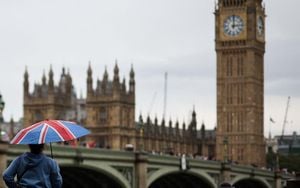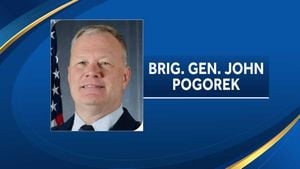Controversy has erupted surrounding the political career of Minnesota Governor Tim Walz, particularly focusing on allegations about his past romance with the daughter of a high-ranking Chinese Communist Party (CCP) official. This connection has garnered heightened scrutiny, especially with the nearing 2024 presidential election. Senator Marco Rubio, recognized for his hawkish stance on China, has been vocal about the need for investigation, citing national security concerns stemming from Walz’s alleged ties.
According to reports, Walz reportedly began his relationship with Jenna Wang back in 1989 during his time teaching English in China. Both were young and naïve to the potential ramifications of their association—Wang, just 24 at the time, is the daughter of Bin Hui, who held significant standing within the CCP. Their alleged romance unfolded quietly, away from prying eyes, as public affection could have dire consequences for Wang, whose father would have disapproved of her intermingling with a westerner.
The love affair, as depicted by reports, involved intimate encounters setting the stage for memories intertwined with George Michael ballads like “Careless Whisper.” Amidst the backdrop of post-Tiananmen China, Walz and Wang’s relationship harbored layers of complexity, marked by furtive encounters where affection was expressed but rarely publicized. Yet, beneath this romantic veneer lay darker undertones of manipulation and potential exploitation, as suggested by allegations raised later.
Fast forward to the present, and the ramifications of this past spark have become amplified by Walz’s political aspirations, especially as he positions himself alongside Kamala Harris as the 2024 vice presidential nominee. Rubio’s call for clarity on this matter is not merely for sensationalism; he urgently stresses the need for transparency. "If the story is true, Tim Walz had a relationship with the daughter of a high-ranking Chinese Communist Party official," he tweeted. "If you aspire to be Vice-President of the United States, voters deserve to know everything about any and every link you have to the CCP."
These allegations raise perplexing questions about Walz’s conduct during his military service. Not long before meeting Wang, he served eight years as part of the U.S. military, with specific obligations to report foreign relationships and travel to potentially hostile nations, which China was classified as at the time. Did Walz comply with these regulations, or does this relationship suggest lapses in judgment or even protocol violations?
House Committee on Oversight and Accountability Chairman James Comer elaborated on such concerns, emphasizing findings from internal communications obtained via whistleblowers alleging the DHS has faced challenges confronting the CCP’s influence over American state and local leaders. According to these communications, staff within the agency expressed concerns about Walz—their urgency points toward awareness of his romantic past and its potential to be leveraged for influence or machination on the political stage.
Despite the dubious circumstances—allegations of Walz’s past romantic liaison being leveraged to assert control over political leaders like Walz—there remains ambiguity about the narrative itself. Efforts by the DHS to deflect scrutiny through non-compliance with subpoena requests have fueled skepticism and heightened mistrust between the agency and Congress. Questions persist: why now? What is being hidden?
Comer’s investigation couldn’t have come at a more politically charged time; we're just days away from important elections. Voter sentiments swing heavily during this period, and any hint of scandal can derail political careers. The investigation not only casts shadows over Walz’s past but also sets the tone for the national dialogue surrounding election integrity and transparency within political campaigns.
"A whistleblower has provided information indicating officials from DHS’s Office of Intelligence and Analysis (I&A) and Homeland Security Investigations (HSI) have been involved with the investigative efforts concerning the CCP, the state of Minnesota, and Governor Walz," Comer noted. This aligns with broader efforts by multiple federal agencies to understand and counter China's international influence, particularly its attempts to infiltrate and manipulate U.S. politicians.
The murky overlap between personal relationships and government responsibilities leaves voters, and, by extension, stakeholders, grappling with the question: can such connectivity compromise national security? Experts signal discomfort particularly because military members with security clearances are often warned against intimate relationships abroad. This could expose them to potential blackmail—which poses an immediate risk to national interests.
Walz’s various official trips to China between 1993 and 2003 are similarly under scrutiny. Reports indicate he may not have adhered to the requisite disclosures mandated for military personnel engaging with foreign entities. These trips included business ventures and cultural exchange programs funded by the Chinese government, raising alarms about the nature and motivation behind such funding.
Compromised trust goes beyond mere romantic entanglements; it ricochets through state and federal relations, drawing lines between personal ethics and political integrity. The National Guard has been reticent about disclosing relevant details about Walz’s military service, proposing problems and evasions strengthening doubts on how officials are handling sensitive information.
Walz has openly claimed his retirement was to focus on political ambitions when he unexpectedly left the military, yet contemporaneous accounts suggest several of his actions to expedite this process seemed aberrantly opaque. Such variables proliferate complexity within Walz’s story, framed by echoes of missing documentation and overlooked characterization of past military encounters.
Given this, the spotlight is on Walz as he seeks to shape public perception surrounding this newfound scrutiny. Disappointingly, his team has remained largely quiet, not engaging substantially with inquiries or allegations surrounding the turbulent past. The stakes have escalated rapidly; what was once thought to be long-buried history now threatens to unroll like an unraveling thread before the upcoming elections. And as Walz attempts to weave together his political ambitions with complex international relations, the scrutiny will likely only intensify.
Looking at the bigger picture, the interplay of personal history and public service towers as one of the defining narratives of the 2024 election. If Senate inquiries, whistleblower testimonies, and political controversies emerge as key issues, American voters will have their work cut out for them: delineate fact from conjecture, love from political maneuvering, nostalgia from accountability.
Walz’s tale serves as both cautionary and enlightening, especially as his supporters and opponents brace for the consequences tied to past choices—one wherein romantic entanglements can spark national crises and ignite debates on fidelity, ethics, and influence at the highest political echelons. The mere mention of Tim Walz’s name now evokes images of not just political ambition but complicity, cautioning future politicians to tread carefully around matters of personal connection and national interest.



